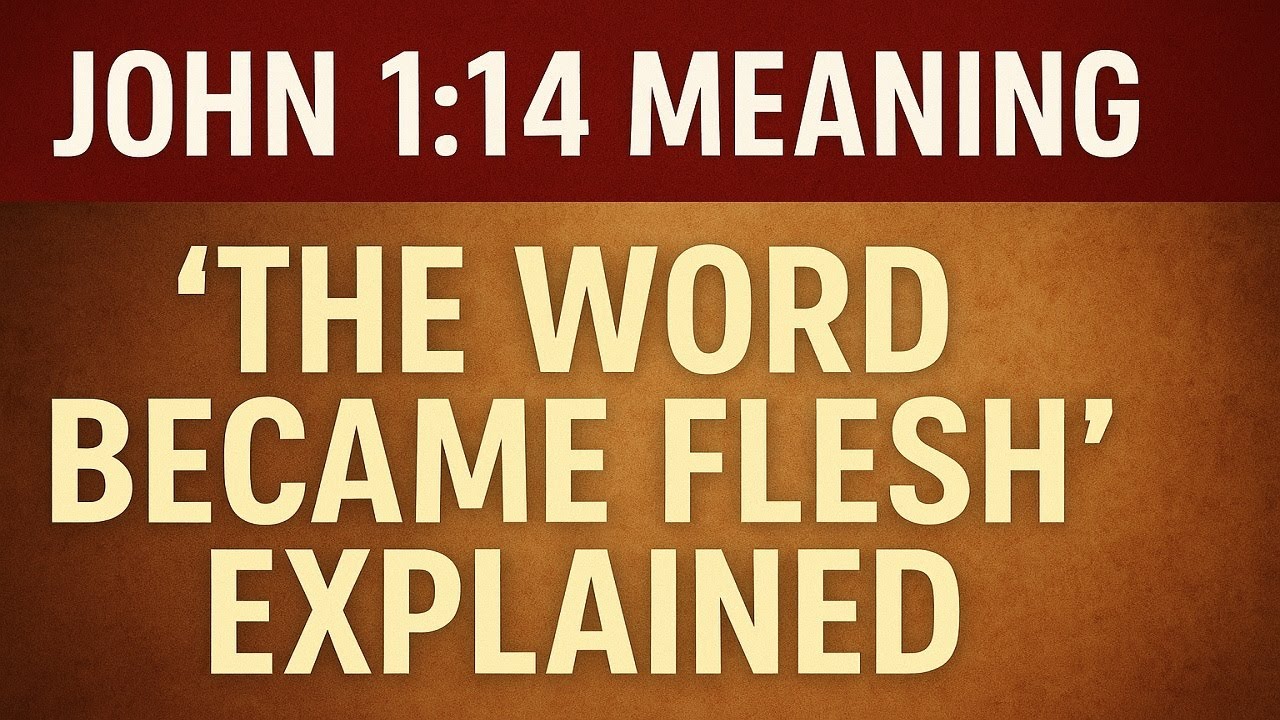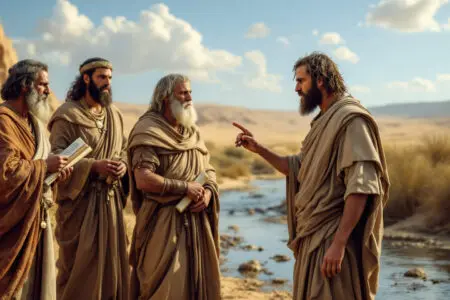Some ideas are simply too big for our minds. They feel like smoke, floating around as abstract words we know but can’t quite grab. We talk about “infinite love” or “divine justice,” but what do they really look like? What do they feel like? For centuries, humanity wrestled with this very thing—the idea of a God who was powerful and transcendent, yet felt so distant. Unknowable.
Then, in a dusty corner of the Roman Empire, a fisherman-turned-apostle named John picked up a pen and changed everything. He wrote the most earth-shattering sentence in history: “And the Word became flesh and dwelt among us.” That single verse is the hinge on which all of Christianity swings. To truly get the John 1:14 meaning isn’t just an academic exercise. It’s about discovering the very heart of God. It’s a revolution in a sentence.
This verse declares that the abstract became concrete. The divine put on skin. God moved into the neighborhood. Over the next few minutes, we’re going to pull back the layers of this profound statement and explore why these few words continue to change lives, offer unshakable hope, and redefine everything we thought we knew about God.
More in John Chapter 1 Category
Key Takeaways
- The Incarnation is Central: John 1:14 is the clearest declaration of the Incarnation—the Christian doctrine that God the Son took on a human body and nature, becoming both fully God and fully man in the person of Jesus Christ.
- Jesus is the ‘Logos’: The “Word” (Greek: Logos) isn’t just a spoken word but refers to the divine reason, the creative power, and the ultimate self-expression of God. Jesus is the complete and final revelation of who God is.
- God is Relational: The phrase “dwelt among us” (Greek: skēnoō) literally means “pitched his tent.” This directly connects Jesus to the Old Testament Tabernacle, showing He is the new and ultimate place where God’s presence meets humanity. God doesn’t want to be distant; He wants to be with us.
- Glory Redefined: The “glory” seen in Jesus was not just overwhelming power but the stunning perfection of His character, demonstrated through His compassion, teachings, sacrifice, and love. He was, and is, “full of grace and truth.”
What Does It Even Mean for a ‘Word’ to Become a Person?
Before we can really grasp the Word becoming flesh, we have to ask a crucial question: what exactly is “the Word”? When John used the Greek term Logos, he was firing on all cylinders. His audience would have heard it on multiple levels. His Jewish readers would have instantly thought of the powerful, creative Word of God from Genesis 1. “And God said, ‘Let there be light’…” That was the Word that spoke the universe into existence. It was God’s power in action.
At the same time, his Greek-speaking audience would have heard something else. For them, the Logos was a deep philosophical concept—the divine reason, the ordering principle holding the cosmos in perfect harmony. It was the source of all wisdom.
John brilliantly takes both of these powerful ideas and fuses them into a single person. He’s saying that the creative power that spoke galaxies into being and the divine reason that underpins all reality isn’t just a force. It’s not a fuzzy concept.
It’s a person. And His name is Jesus.
So, How Exactly Did the Word ‘Become Flesh’?
Here is where the idea moves from mind-bending to truly radical. The eternal, infinite Word took on a material body. God didn’t just send a memo; He became the message. This event, the Incarnation, stands utterly alone in all of world history and religion.
Was Jesus God Pretending to Be Human?
Not for a second. That’s a common misunderstanding that completely misses the beauty of it. The Word didn’t just wear a human costume or project a convincing avatar. The Bible says He became flesh. This means a true, permanent union of the divine and human natures in one person. Theologians call this the “hypostatic union,” a fancy term for an incredible reality. Jesus was, and is, 100% God and 100% man. He never stopped being God, but He fully embraced what it meant to be human. He felt hungry. He experienced joy and knew profound sorrow.
I remember trying to explain dinosaurs to my son when he was about five. He knew all the names and could recite facts from his books, but it was all abstract. Then we went to the natural history museum. He stood at the foot of a massive T-Rex skeleton, neck craned all the way back. In that moment, it all clicked. The sheer scale, the tangible reality… the idea became breathtakingly real.
The Incarnation is infinitely more profound. For millennia, people had concepts of God’s love. But in Jesus, that love became tangible. It had hands that healed and feet that walked on dusty roads. The concept became a person.
Why Was ‘Flesh’ Such a Radical Idea?
In the ancient Greek world, many people believed in dualism. This philosophy taught that the spiritual world was pure and good, while the physical world—especially the “flesh”—was corrupt and weak, a prison for the soul. The goal was to escape the body and ascend to the purely spiritual.
John’s declaration shatters that worldview. God didn’t see “flesh” as evil or beneath Him. He affirmed the goodness of His creation by willingly entering into it. He took on blood, bone, and muscle. This act elevates the human experience. It tells us our lives matter to God. Our bodies aren’t prisons to be escaped; they are creations so valued that God Himself would take one on.
What Does “Dwelt Among Us” Really Imply?
This phrase is so much richer than it looks. The Greek word John uses for “dwelt” is skēnoō, which literally means “to pitch a tent” or “to live in a tabernacle.”
Any Jewish reader would have felt the power of that word immediately. It’s a direct echo of the Old Testament. After God rescued Israel from Egypt, He had them build a Tabernacle, a sacred tent, so His glorious presence could dwell right in their midst. The Tabernacle was the center of their camp, the place where heaven and earth met. God was with His people.
So when John says Jesus “pitched His tent among us,” he’s making a breathtaking claim. He’s declaring that Jesus is the new, living, breathing Tabernacle. He is the ultimate meeting place between God and humanity. The old tent was just a shadow; Jesus is the reality. God is no longer limited to a specific building.
He is here. With us. Walking beside us.
We Beheld His Glory? What Glory Was Visible in a Humble Carpenter?
When we hear “glory,” we imagine blinding light or overwhelming power. In the Old Testament, God’s glory often did appear that way—a pillar of fire, a cloud on a mountain. But the glory of Jesus was different. John says it was the “glory as of the only Son from the Father.”
Isn’t ‘Glory’ Usually About Blinding Light and Power?
The glory seen in Jesus wasn’t about a visible halo but about the visible perfection of His character. People saw His glory when He turned water into wine, sure. But they also saw it when He wept at a friend’s grave. They saw it when He touched and healed a leper society had thrown away. They saw it when He washed his disciples’ dirty feet.
His glory was the glory of perfect love in action. It was the glory of profound wisdom spoken with stunning simplicity. His glory was absolute holiness mixed with radical compassion. The greatest display of His glory, ultimately, was on the cross, where God’s perfect love and justice met in a single, world-changing act.
I’ll never forget waiting at the airport for my wife to return from a long trip overseas. I must have checked the arrivals board a hundred times. I scanned the sea of faces pouring through the gate, heart pounding. Then, I saw her. Our eyes met. In that single moment, seeing her face was more than just recognizing a person. It was home. It was peace. It was everything being right with the world again. To me, that sight was glorious.
“Beholding His glory” is something like that. It’s looking at Jesus and seeing the face of perfect love. It’s seeing the character of God and finally feeling at home.
What Does ‘Glory as of the Only Son from the Father’ Signify?
This phrase hammers home the absolute uniqueness of Jesus. The Greek term here is monogenēs. While often translated “only begotten,” a better sense is “one of a kind” or “unique.” Plenty of people in the Bible are called children of God, but Jesus is in a category all His own. He is the Son.
His relationship with God the Father is eternal and perfect. He doesn’t just reflect the Father’s glory; He shares it. As a resource from Duke University’s Divinity School might explain, this points to a unique relationship within the very nature of God. When we look at Jesus, we get a pure, undiluted view of what the Father is like.
What Does It Mean That He Was “Full of Grace and Truth”?
John caps off this incredible verse by summarizing the character of the incarnate Word. Jesus perfectly embodies two qualities that often seem to be in tension for us: grace and truth.
He isn’t half grace and half truth. He is 100% full of both, perfectly and simultaneously.
Grace (charis) is unmerited favor. It’s getting the exact opposite of what you deserve. It’s God’s relentless, undeserved goodness in action. Jesus’s life overflowed with it:
- He consistently moved toward the outcasts, the people “good” religious society avoided.
- He healed the sick not because they earned it, but simply out of compassion.
- He told stories about a Father who runs to welcome home his rebellious son.
- His final words on the cross were, “Father, forgive them.” That’s grace.
Truth (aletheia) is reality as it really is. Jesus didn’t just speak true words; He embodied truth. He peels back our self-deception and shows us who God truly is—not a cosmic tyrant, but a loving Father. He also shows us who we are—made in God’s image, but broken and in desperate need of a savior. He is the ultimate reality.
Jesus holds both in perfect balance. He never watered down the truth to be more gracious, nor did He ever wield the truth without grace. He spoke hard truths to the proud and offered infinite grace to the humble. To the woman caught in adultery, He offered the grace of “Neither do I condemn you,” followed immediately by the truth of “Go, and sin no more.” He is the perfect blend.
Why Does the Meaning of John 1:14 Still Matter So Much Today?
This isn’t just ancient history. It’s not abstract theology. The reality that the Word became flesh is the bedrock of Christian hope, and it has massive implications for our lives right now.
First, it means God is knowable. He isn’t a distant force or a set of rules. He has a face. He has a name. If you want to know what God is like, you look at Jesus. His life, His teachings, His sacrifice—that is the clearest picture of God’s heart we will ever have.
Second, it gives our lives profound value. The fact that God was willing to enter our messy, painful world means that no part of our human experience is beyond His reach. Your struggles, your work, your relationships, your physical body—it all matters to Him.
Finally, it shows us the way home. Jesus didn’t just come to be a good example; He came to be a rescuer. By living the perfect life we couldn’t and dying the death we deserved, He bridged the gap that separated us from God. The incarnation means that God isn’t waiting for you to clean up your act; He came down into the mess to meet you. It means your physical life isn’t a meaningless accident but a gift so precious that God Himself partook in it. It means you don’t have to guess what pleases God; you can look at Jesus, full of grace and truth. It means hope is not a flimsy wish. Hope is a person.
The statement “the Word became flesh” is, quite simply, the best news the world has ever heard. The infinite became an infant. The untouchable became touchable. The abstract concept of God’s love put on skin and bones and walked among us, showing us the path back home. And that changes everything.
FAQ – John 1:14 Meaning

Why does the message of John 1:14 still hold relevance today?
It affirms that God is knowable through Jesus, it values human life and experience, and offers hope by showing God’s active presence and salvation in our world.
How does the concept of ‘the Word’ (Logos) help us understand Jesus’ identity?
The Logos refers to divine reason and creative power, and in John, it reveals that Jesus is the ultimate divine expression, who was active in creation and is the final revelation of God.
What is the importance of Jesus being described as ‘full of grace and truth’?
This description highlights that Jesus perfectly embodies both unmerited favor and absolute reality, offering compassionate love and truthful revelation simultaneously.
Why is the phrase ‘dwelt among us’ significant in understanding Jesus’ relationship with God and humanity?
The phrase ‘dwelt among us’ indicates that Jesus is the new Tabernacle, embodying God’s presence in human form and emphasizing the intimate relationship God desires with humanity.






